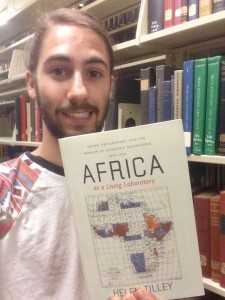Africa as a Living Laboratory
For this shelfie assignment I set out to find a book having to do with colonization. The first item I searched was “colonization”, however, the results I yielded were too broad. To make my search terms more specific, I added “eighteenth century”. Again, I did not find any books that I fancied, and instead of searching “eighteenth century colonization” I searched “colonization + Africa”. I decided on Africa because we spent an extensive amount of time covering the scramble for Africa in addition to reading Abina and the Important Men. The first three results yielded after using these search terms were basic histories recounting the scramble for Africa, but the fourth was unique. The book I found is called Africa as a Living Laboratory: Empire, Development, and the Problem of Scientific Knowledge 1870-1950 written by Helen Tilley. Flanking this book on the shelf were several other works investigating science’s role in history, but none dealt with the colonization of Africa. In her study, Tilley explores the tricky relationship between imperialism and the role of scientific proficiency. When flipping through the book, I found that Tilley uses an abundance of maps, tables, and charts to advance her investigation and make it more accessible to the average reader. In all, I think this would be a great resource to use when researching colonization for it is unique in that it combines the role of science with imperialism as well as challenges the existing belief of the role of science in the colonization of Africa.
Tilley, Helen. Africa as a Living Laboratory: Empire, Development, and the Problem of Scientific Knowledge, 1870-1950. Chicago: U of Chicago, 2011. Print.
